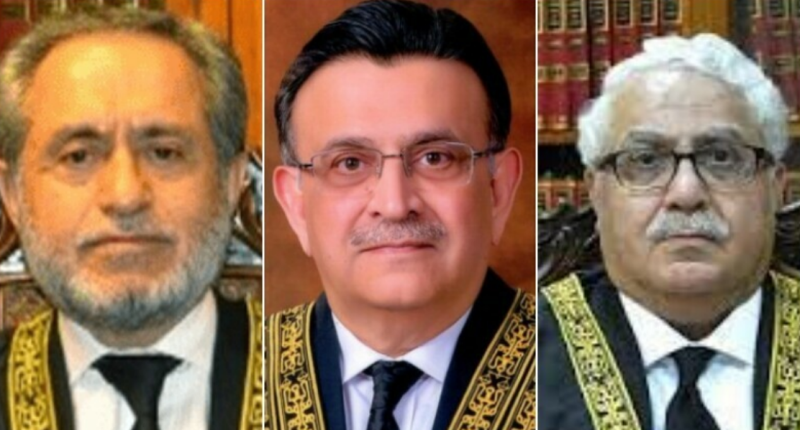Islamabad (Web Desk): Chief Justice of Pakistan (CJP) Umar Ata Bandial on Wednesday observes that there were prima facie shortcomings in the trial court verdict in Toshakhana case against Pakistan Tehreek-e-Insaf (PTI) chief and former premier Imran Khan.
The CJP's remarks came during the hearing on a petition filed by former prime minister Imran Khan against a verdict of the Islamabad High Court (IHC) order of remanding the Toshakhana case to Additional Sessions Judge (ASJ) Humayun Dilawar who convicted the former prime minister.
A three-member SC bench, comprising CJP Umar Ata Bandial, Justice Mazahar Ali Akbar Naqvi and Justice Jamal Khan Mandokhail heard the petition.
At the outset of the hearing, former premier's lawyer Latif Khosa said the PTI chief had filed three petitions against IHC orders in the apex court.
He recalled that Khan was elected as a member of the National Assembly from Mianwali during the 2018 elections.
“The Election Act tells every members of the NA to submit details of their assets,” the lawyer said, adding that six MNAs had submitted a reference to the speaker seeking the PTI chief’s disqualification.
He said that these lawmakers had accused the PTI chief of submitting an incorrect declaration of his assets.
The speaker had then sent the reference to the Election Commission of Pakistan (ECP) under Section 137 of the Election Act.
Justice Naqvi asked the lawyer to read out the said section of the act, which pertains to the submission of a statement of assets and liabilities.
Continuing his arguments, Khosa contended that the ECP could only conduct an inquiry within 120 days.
“Can one member [of the NA] send a reference against another member?” Justice Naqvi asked, to which the lawyer replied that no one could send a reference and the ECP too could only conduct an inquiry within a fixed time.
“Action can be taken within 120 days after submission of financial statements,” he highlighted, adding that only the NA speaker could send a reference to the ECP, not a member.
The reference against the PTI chief, Khosa continued, was sent after 120 days.
At that, Justice Mandokhel interjected that the petitioner’s case was against the IHC order and not the legality of the reference against Imran.
“Who can be remanded now that the trial court case is over?” the judge asked. “How will this case impact the main appeal against the conviction?”
The lawyer said the court would have to “rewind the hands of the clock back to the previous position”.
However, the CJP remarked, “A building constructed on faulty foundation cannot be demolished every time.” He also asked if the petitioner’s argument was that the ECP’s complaint in the trial court, filed on Oct 21, was not maintainable.
“Our stance is that the Toshakhana complaint should have first been sent to the magistrate,” Khosa pointed out.
“According to you, the magistrate conducts the initial inquiry and then the sessions court holds the trial,” the chief justice asked.
At this, Justice Mandokhel explained that the law states a magistrate would review the complaint and then send it to the sessions court.
During the hearing, the SC raised questions on the trial court's judgment awarding a three-year sentence to Imran Khan in the case.
The apex court asked bench to consider the former premier's contentions about the trial court's jurisdiction, maintainability of the complaint and transfer of judges etc. tomorrow.
The bench also questioned the urgency shown by the trial court in deciding the case without recording the statements of witnesses.
The court adjourned the hearing of the case till tomorrow (Thursday).


